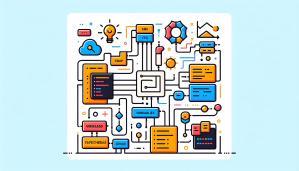Introduction
Programming logic forms the backbone of software development, enabling computers to process commands and make decisions effectively. Whether you’re writing basic scripts or building complex applications, understanding the fundamental concepts of programming logic is essential. This guide explores the core building blocks—variables, data types, control structures, and basic operations—that every aspiring programmer should master.
Variables: The Cornerstone of Programs
Variables are like labeled storage boxes that hold data your program needs. They allow you to store information, perform calculations, and handle user input dynamically.
- Declaration: Creating a variable by giving it a name.
- Assignment: Giving a variable a specific value.
- Scope: The part of the program where a variable is accessible.
Data Types: Defining the Kind of Data
Data types determine what kind of information a variable can hold. Understanding these helps prevent errors and improves code efficiency. Common examples include:
- Integers: Whole numbers like
7or-15. - Floats: Numbers with decimals, such as
3.14. - Strings: Text data, like
"Hello World". - Booleans: Logical values—
trueorfalse.
Control Structures: Directing the Flow
Control structures dictate how a program runs based on conditions or repetitions.
- Conditional Statements (if, else): Execute different actions depending on specific conditions.
- Loops (for, while): Repeat blocks of code until a condition is met.
These structures make programs adaptable, responsive, and capable of handling various scenarios.
Basic Operations and Expressions
Every programming language offers basic operations for calculations and comparisons:
- Arithmetic: Addition, subtraction, multiplication, division.
- Comparison: Greater than, less than, equals.
When combined, these form expressions that evaluate values and control decision-making.
Practice and Application
Practical application is the fastest way to master these concepts. Start small:
- Build a basic calculator.
- Create a number guessing game.
- Experiment with different variable types and control structures.
Hands-on practice reinforces theoretical knowledge and develops problem-solving skills.
Conclusion
Understanding programming logic’s core concepts—variables, data types, control structures, and basic operations—is the first step toward becoming a skilled developer. With regular practice, you’ll gain the ability to build efficient, adaptable, and complex solutions in any programming language.








